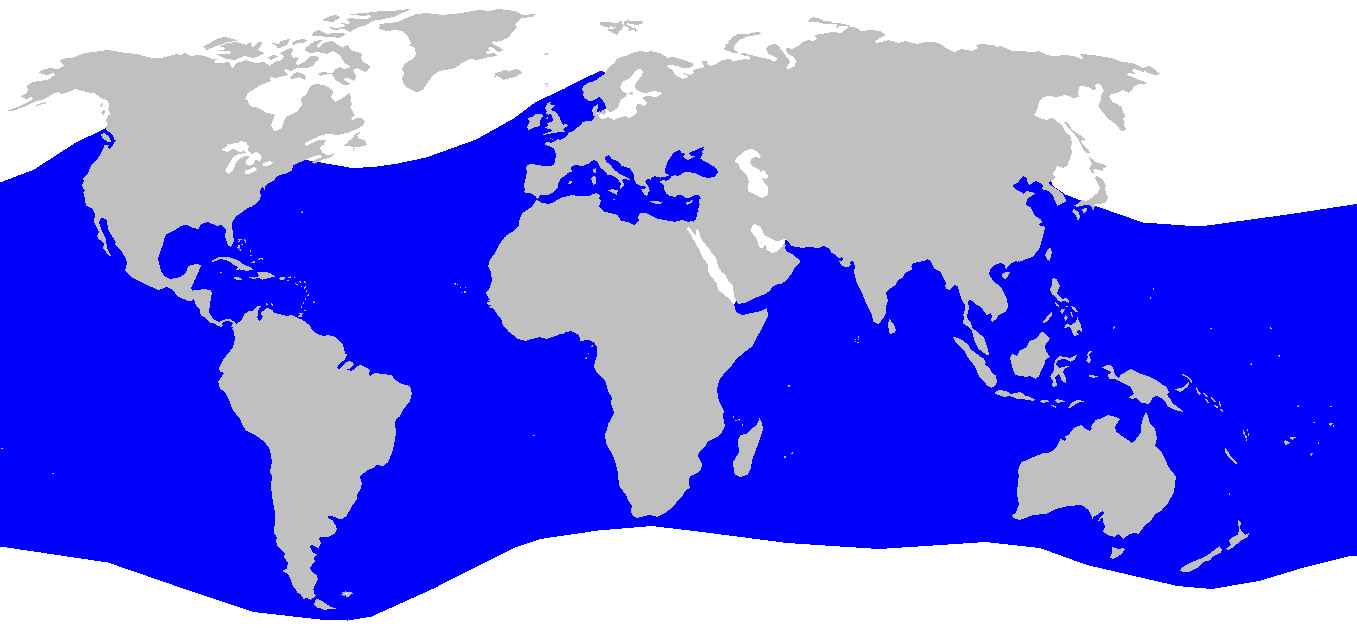
Animal description
The Common thresher (Alopias vulpinus), also known simply as the thresher shark, is a captivating marine creature that belongs to the family Alopiidae. This species is renowned for its distinctive physical appearance and fascinating behaviors, making it a subject of interest among marine biologists and ocean enthusiasts alike.One of the most striking features of the Common thresher is its exceptionally long, whip-like tail, which can be as long as the shark's body itself. This unique tail is not just for show; it serves a critical role in the thresher's hunting strategy. The shark uses its agile tail to stun small fish, which are its primary prey, making them easier to capture. This method of hunting is both efficient and spectacular, showcasing the evolutionary adaptations of this species.
The Common thresher shark has a sleek, streamlined body that aids in its swift movement through the water. Its skin is typically a beautiful shade of dark blue or gray on the back, transitioning to a lighter, almost metallic shade on the sides and a white underbelly. This coloration provides excellent camouflage in the open ocean, allowing it to approach prey undetected or evade larger predators.
In terms of size, the Common thresher can reach impressive lengths. Adult specimens commonly measure between 15 to 20 feet (4.5 to 6 meters), with the tail accounting for about half of their total length. Despite their size, these sharks are known for their relatively docile nature and are not considered a significant threat to humans.
Common threshers are found in temperate and tropical oceans worldwide. They are pelagic, meaning they prefer the open ocean, but can occasionally be seen closer to the shore, especially in areas where their prey is abundant. They are solitary creatures, coming together only for breeding purposes.
Reproduction in Common threshers is viviparous, with the female giving birth to live young after a gestation period. The young sharks are born fully formed and are independent from birth, receiving no parental care. This reproductive strategy ensures that a relatively high percentage of offspring reach maturity, critical for the survival of the species in the wild.
Despite their fascinating nature, Common thresher sharks face several threats, primarily from human activities. They are often caught as bycatch in fisheries targeting other species, and their distinctive tails make them a target for the shark fin trade. Conservation efforts are ongoing to ensure the survival of this unique species, with measures including monitoring populations, regulating fisheries, and raising public awareness about the importance of sharks in marine ecosystems.
In conclusion, the Common thresher shark is a remarkable creature that plays an essential role in the marine environment. Its unique physical attributes and behaviors make it a standout species in the ocean's vast biodiversity. As with many marine species, understanding and protecting the Common thresher is crucial for maintaining the health and balance of ocean ecosystems.
Map of occurrence

New photos of animals
Top 10 animals
- Dolphin gull (Leucophaeus scoresbii)
- Diana monkey (Cercopithecus diana)
- Moustached guenon (Cercopithecus cephus)
- Galápagos tortoise (Geochelone nigra complex)
- Stone loach (Barbatula barbatula)
- Greek tortoise (Testudo graeca)
- Japanese macaque (Macaca fuscata)
- Russian tortoise (Testudo horsfieldii)
- Common flying dragon (Draco volans)
- Galápagos penguin (Spheniscus mendiculus)